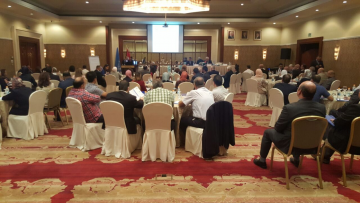
Under the auspices of Jordan Minister for Planning and International Cooperation, the ESCWA Technology Centre organized a meeting entitled “National Capacities in Science and Technology at the Service of National Priorities and the Implementation of UN Sustainable Development Goals,” on 26 September in Amman. The meeting was held in cooperation with the Higher Council for Science and Technology, and with the participation of the UN Country Team for SDGs. It was attended by representatives of 53 institutions from the private and public sectors, and the civil society.
Delivering the statement of the Jordan Minister for Planning and International Cooperation, was Director of the Department of Development Plans and Projects Ziad Obeidat, who noted that science, technology and innovation play a vital role in achieving sustainable development in all its aspects and phases. Here is a big responsibility to be shouldered by adopting national policies that promote the use of technology and innovation, and following a comprehensive that integrates these elements into national plans.
For his part, Secretary General of the Higher Council for Science and Technology Khalid Elshuraydeh pointed out that human capacities in technology are the most salient elements of economic success in any State.
Director of ESCWA Technology for Development Division Haidar Fraihat said in his statement that the 18-member strong Regional Commission is entrusted with a vital role by the UN to assist Arab countries in achieving SDGs. He added that the role of ESCWA complements that of other UN agencies in this field.
ETC Executive Director Foud Mrad also delivered a presentation on the use of science, technology and innovation, stating examples of the crucial role of science and technology in achieving SDGs. He underlined the importance of local institutions to this end, and laid out national plans and strategies in Jordan that are harmonized and show an Arab and Jordanian translation of all the goals that service their implementation.
The debate was then opened on the role of different relevant institutions, and the steps they will take to implement the outcomes of the meeting.





